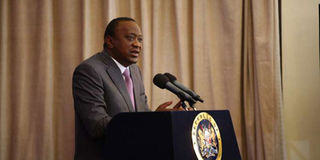Affordability is the ultimate gift in household power access

President Uhuru Kenyatta addresses participants of the State House Energy Summit at State House in Nairobi on July 27, 2016. PHOTO | EVANS HABIL | NATION MEDIA GROUP
What you need to know:
In the past, households led a below average standard of life.
This is why I laud the Jubilee government for making appreciable efforts to erase this injustice—by providing electricity to Kenyan households.
A scrutiny of the overheads many businesses accrue show between 20 and 30 per cent consists of power cost.
I am aware of the government’s interest in geothermal power in its bid to reduce cost of power production. In 2013, the country had slightly more than 1,700 MW, which has now increased to more than 2,300 MW.
This has further led to retail cost dropping by Sh10 per unit in three years to the current Sh13 per unit.
Yet, not many families can afford this rate.
In yesteryears, households in urban and rural areas lived in semi-darkness as families strived to raise money for paraffin to cook and light koroboi lamps.
In rural areas, things were even grimmer. Schoolchildren would, in alternate duties, fetch heaps of firewood to light up their kitchens in order to do homework. Girls and women, their babies strapped on their backs, would fetch firewood for a whole day, squandering most of their productive time.
All this led to a life of struggle. A life of pure strife. A life that, to a large extent, was dehumanising. Households led a below average standard of life. This is why I laud the Jubilee government for making appreciable efforts to erase this injustice—by providing electricity to Kenyan households.
When this effort is fully implemented, the government will leave indelible marks in its legacy building process. Power connection was until recently only associated with the elite in our society. Not anymore. Today, an ordinary family can pride itself in having electricity in their modest home and children can easily carry out their academic tasks more comfortably.
The State House Energy Summit at State House in Nairobi on July 27 was music to many ears.
A perusal of government held data shows that in three years, 2.6 million new households have been connected with power.
When the grand coalition government was calling it a day in early 2013, only 2.2 million homes in Kenya were connected to electricity. Today, we have 4.8 million families connected to power.
This is a significant milestone for a government that wants to return to its citizens to seek a second term. Data also shows 2015 was the best year in Kenya’s electricity connection programme. Some 1,250,000 households were connected!
BETTER LIVES
Would we still say nothing has been done to better our lives these three years? In years gone, it would cost Sh35,000 to get connected, in addition to other residue costs associated with dishonest power supply officials. The delays were long and, in several cases, it took between five and 10 years before one could switch on the lights.
This power revolution is a great gift to families. Today, 60 per cent of Kenyans are connected to power. I have reliably established that programmes such as the Last Mile Connectivity Project, which charges Sh15,000 will hasten coverage of the remaining areas. At a projected 70 per cent coverage by next year, and universal coverage by 2020, it can only be construed to mean Kenyans will lead better lives going forward.
Power in our villages will mean more time will be spent on productive engagements. In urban areas, it will mean better health and more fulfilling lives devoid of neck-breaking struggles to remain safe outside our houses.
Security in urban areas has drastically improved due to lighting dark alleys from where criminals attacked innocent Kenyans. Today, many market traders can conduct business beyond sunlight.
In an agricultural perspective, more power will open up avenues to commercialise agriculture. This can be enabled by being able to utilise water for commercial purposes or even small value addition enterprises within farms
Those in urban areas will have more real opportunity to start their own small enterprises with minimal overheads most of which is related to electricity.
This leads me to make a passionate appeal to the government to strive to bring the cost of power down. To safeguard the gains that will accrue from this power coverage, power must be affordable to low cost earners.
A scrutiny of the overheads many businesses accrue show between 20 and 30 per cent consists of power cost. I am aware of the government’s interest in geothermal power in its bid to reduce cost of power production. In 2013, the country had slightly more than 1,700 MW, which has now increased to more than 2,300 MW.
This has further led to retail cost dropping by Sh10 per unit in three years to the current Sh13 per unit. Yet, not many families can afford this rate.
Wambui Ng’ang’a is a women’s leader in Nairobi.




